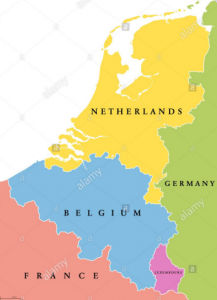This article is written by Alfaiz Nizami, pursuing a Diploma in Business Laws for In House Counsels from Lawsikho.
“You can change your wife, your politics, your religion, but never, never can you change your favorite football team”- Eric Cantona
Table of Contents
Introduction
Being a football fanatic is a beautiful journey, there are ups and downs, days when your club doesn’t win anything, not a single match, but then there are days when your club wins everything that is playable. Apart from the squad depth and form, there are other things that have equal importance and effect on the performance of the clubs, and that are “Funds.” The club needs funds to operate, and a lot that comes from the fans, but due to the Pandemic, everything turned pale. This created a lot of buzz in the football world as most of the clubs started having financial crises. To counter that, clubs have started exploring unconventional ways like creating their own league or merging different leagues. For the sake of brevity, I will analyze the proposed merger of the Dutch and Belgian football leagues.
The gist of the Dutch and Belgian League
Dutch League
The Eredivisie is the Netherlands’ highest professional football league. The league was established in 1956, two years after professional football was introduced in the Netherlands. The top division consists of 18 clubs. Each club meets every other club twice during the season, once at home and once away. At the end of each season, the club at the bottom is automatically relegated to the second level of the Dutch league system, the Jupiler League (First Division). At the same time, the First Division champions will be promoted to the Eredivisie automatically. The bottom two clubs in the Eredivisie will compete in separate promotion/relegation play-offs.
Belgian League
Also known as Jupiler Pro League because of its sponsorship with AB In Bey’s brewer Juplier since the 2015-16 season. It is the top-tier league contested by 18 Belgian clubs. The league is based on the system of promotion and relegation with the Belgian First Division B. Each club meets every other club twice during the season, once at home and once away. The promotion and relegation are similar to that of the Eredivisie.
Why is there a need for a merger?

“It’s a matter of survival. The sooner The better. The major European clubs have plans to isolate themselves and establish their own leagues. As a result, the financial strength of these clubs may double or triple, while we are left with very little resources to make progress. That is why we have to open the borders and become stronger together. There is a lot of talent in our country. We can keep the best players here longer if we can offer them a better competition” -VincentKompany (Former Man city Captain and the current manager of Anderlecht).
In the past 20 years, the dominance of clubs from Premier League, La Liga, Serie A, Bundesliga, and Ligue One have grown significantly. The critics feel that the reason behind it is the accumulation of wealth in a few big clubs. This results in raw talent from countries like Belgium and Netherlands leaving their homelands and move to the bigger clubs.
Ajax class of 19 is the classic example and the reason why there is a need for a merger to form a more competitive and entertaining league. Ajax managed to create a young energetic squad and reached the Champions League semi-final. However, the very next season most of the stars were cherry-picked from Ajax. [Matthijs De Light left for Juventus, Frenkie De Jong to Barcelona, Hakim Ziyech to Chelsea].
Football at the end of the day is about loyalty and it breaks the heart of millions of fans when they see their idols moving to other countries for the sake of fame and money. The proposed merger of the Belgian and Dutch League brings a slight hope for the domestic supporters. If the merger goes as planned, then Belgian and Dutch clubs can again compete with the giants of football, not only that they could also create a new fan base for all these clubs. This may also result in raw talent being recognised by the scouts and retaining them for a longer period of time.
Proposed merger
The Pro League football clubs in Belgium have unanimously voted in favour of merging with the Dutch Eredivisie. However, the Dutch side is yet to confirm. The Belgian and Dutch top-flight divisions would join to form a new cross-border league known as the ‘BeNeLeague,’ with the league’s details and format still to be determined.
Both the Belgian and Dutch have been discussing the format of the league for months, they are yet to announce anything formal. But the composition of BeNeLeague is confirmed. The BeNeLeague will consist of ‘8’ Belgian clubs and ‘10’ Dutch clubs making it a total of 18 club leagues. The remaining ‘10’ clubs in the Belgian pro-league, along with the eight clubs from Belgium’s second tier, would form a separate domestic league. The potential Belgian clubs are Club Brugge, Anderlecht, Standard Liege, Gent, Genk, Royal Antwerp, and Charleroi, with the eighth team still to be determined. From the Eredivisie, Ajax, PSV Eindhoven, Feyenoord, and AZ Alkmaar have been tipped to join the league.
How many Champions League spots will be given to the BeNeleague?
It is not clear as of now. The number of teams each association enters in the UEFA Champions League is determined by the member associations’ UEFA coefficients. The results of clubs representing each association during the last five UEFA Champions League and UEFA Europa League seasons are used to calculate these scores. The higher an association’s coefficient, the more teams it will send to the Champions League and the fewer qualification rounds its teams will have to compete in.
- For e.g.- If a team finishes at 4th place in the Premier League then it will be enough for them to secure a champions league spot but if a team in Ligue-1 (France) finishes 4th then they will only make it to the Europa League because France has only 3 champions league spot because of their UEFA coefficient. The defending champion’s league & Europa winner secure a place in the Champions League automatically.
This merger is likely to create a highly competitive league and produce clubs that can compete with football giants like Real Madrid, Barcelona at par. Currently, the UEFA country coefficients of Belgium and Netherlands are 9 and 7 respectively.
Looking at the revenue model
Fans are fuel to the clubs, with revenue being limited or clubs getting in debt. It has become difficult for clubs to retain their players or make new signings. According to research conducted by Deloitte last year, the BeNeLeague could produce up to €400 million per year in television rights and marketing agreements, providing a financial boost to the respective clubs, which has been cited as one of the key motives for the merger. This will also bring media coverage, more sponsors, and tourism to the countries. Both the leagues have their current TV deals sealed till 2024, so it can be anticipated that we can expect the league to start from the year 2025.
Impact of BeNeleague
The merging of the Dutch and Belgium League could be a game-changer for both the countries’ domestic leagues, but it poses an imminent danger to the fundamentals of the domestic league. If the proposed merger becomes a success then it is a possibility that other small domestic leagues could also follow the line. This creates a threat to smaller clubs having financial restraints and low rankings as the concept of cross-border mergers is based on creating revenue and small clubs will be ousted from the merged leagues.
Role of UEFA in finalising the merger
UEFA is the European football governing body. It is one of six continental confederations of world football’s governing body “FIFA”. All rights to organize all international football competitions in Europe are retained by UEFA. European Union competition law prohibits anti-competitive behavior, i.e. behavior that restricts competition on the market. However, Football is different and differs from other traditional businesses. As of now, there is no concrete law and UEFA is open to accept cross-border mergers of different leagues if there are approvals from all the major clubs.
Criticisms following the proposal
Just like a day is followed by night, proposals are followed by criticism. The biggest criticism about the proposed merger is done by the traditionalist or clubs who will be left behind and their supporters will have less to cheer for, as the giants of their respective leagues will leave the competition. Some supporters feel that after the formation of BeNeleague, the importance of the domestic league would fall short and can result in revenue shortages.
English teams’ dropping out of European Super League (ESL) is a classic example of how criticism can be an effective tool. Critics claimed that having 15 clubs in the ESL not suffering qualification or relegation would have devalued the game by making it unfair and uncompetitive.
Arsenal, for example, has not qualified for the Champions League since the 2016-17 campaign, but they would have been assured a spot regardless of their domestic league performance. However, a future winner of the Premier League would not necessarily have qualified for the ESL if they were not a permanent member. This was one of the biggest criticisms of ESL as football is all about competition and guaranteeing clubs a permanent place would defeat the purpose.
Conclusion
Football is a global sport, with growing globalisation it is inevitable to prevent cross-border leagues. This will also reduce the enmity between the border countries. This concept is likely to be adopted by other countries as well. Cross-border leagues will reduce the gap between big associations and small associations. However, BeNeleague is not the only cross-border league being discussed. There is news from US-Mexico and Pan African Leagues being formed. Post-pandemic can surprise us with some drastic changes in the football world. It may be hard for some traditional supporters to swallow this pill but at the end of the day football is still business done by big corporations in the name of entertainment & anything which falls out of their profit bucket is of no use.
References
- https://eredivisie.nl/en-us/info/our-history#:~:text=The%20Eredivisie%20is%20the%20highest,at%20home%20and%20once%20away.
- https://www.dailyrecord.co.uk/sport/football/football-news/how-belgian-dutch-leagues-merger-23747660
- https://footballpink.net/beneliga-is-this-footballs-future/
- https://bleacherreport.com/articles/2819840-uefa-champions-league-explained-how-the-tournament-works#:~:text=Each%20of%20the%20top%2012,once%20the%2032%20teams%20qualify%3F
- https://www.uefa.com/memberassociations/uefarankings/country/#/yr/2021
- https://www.bbc.com/news/business-56768728
- https://www.europarl.europa.eu/factsheets/en/sheet/82/competition-policy
- https://www.newstalk.com/sport/belgian-clubs-vote-in-favour-of-beneleague-merger-with-dutch-eredivise-1165901#:~:text=Belgian%20clubs%20vote%20in%20favour%20of%20BeNeLeague%20merger%20with%20Dutch%20Eredivise,-Richie%20McCormack&text=Belgian%20Pro%20League%20clubs%20have,merger%20with%20the%20Dutch%20Eredivisie.&text=The%20BeNeLeague%20has%20been%20publicly,forwards%20coach%20Robin%20Van%20Persie.
Students of LawSikho courses regularly produce writing assignments and work on practical exercises as a part of their coursework and develop themselves in real-life practical skills.
LawSikho has created a telegram group for exchanging legal knowledge, referrals, and various opportunities. You can click on this link and join:
 Serato DJ Crack 2025Serato DJ PRO Crack
Serato DJ Crack 2025Serato DJ PRO Crack










 Allow notifications
Allow notifications


